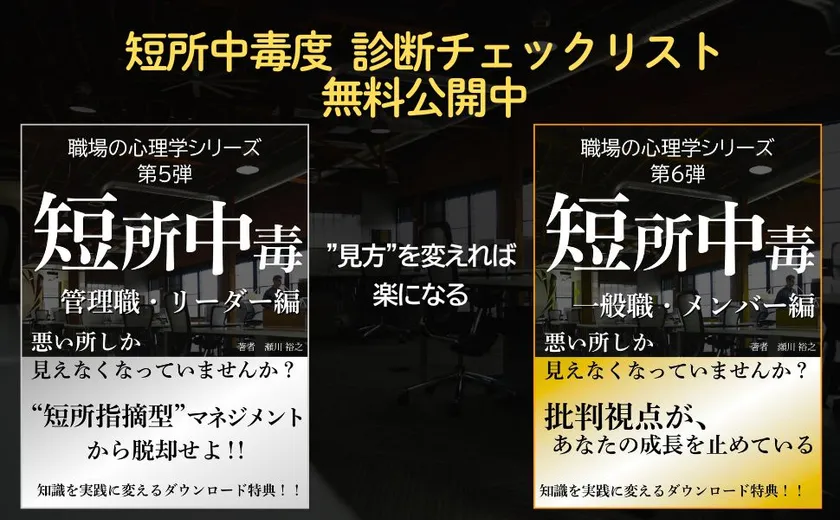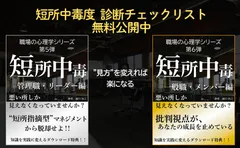Book Explains "Shortcoming Addiction" that Strips Teams of Trust, Collaboration, and Productivity Simultaneous release of a leader's edition and a member's edition!
Excessive Focus on Weaknesses Undermines Workplaces! Warning bells for "shortcomings addiction" lurking in the shadows of declining collaboration
NK総研
NK Soken, an organization management consulting firm, has released two books explaining the new psychological risk "shortcoming addiction" proposed by industrial counselor Hiroyuki Segawa, "Shortcoming Addiction: Management and Leader Edition" and "Shortcoming Addiction: General Staff and Members Edition," as the fifth and sixth books in the Psychology in the Workplace series, on October 20, 2025 released simultaneously on Amazon.

Book: Cons Addiction.
Increasingly, improvement awareness is becoming counterproductive in the corporate workplace. Industrial counselor Hiroyuki Segawa has coined the term "shortcomings addiction" to describe the phenomenon in which trust, collaboration, and productivity slowly decline due to chronic pointing out and criticism and focusing only on shortcomings.
While the importance of psychological safety is widely recognized, there are an increasing number of workplaces where collaboration is reduced due to subtle fraying of human relationships, and meetings and daily communication become heavy - resulting in an unseen decline in productivity.
Lurking in the background is a new psychological risk called "shortcoming addiction.
The "shortcomings addiction" is a psychological habit in which excessive focus is placed on the "shortcomings" of others and oneself, and chronic criticism and finger-pointing undermine trust, collaboration, and creativity, triggering mental illness and job turnover.
In this book, Hiroyuki Segawa explains this concept.
In addition, a free checklist for diagnosing the degree of "shortcoming addiction" is available to visualize the degree of "shortcoming addiction" in yourself and your team. Purchasers will receive the expanded version of the checklist and the Strengths Discovery Worksheet as a bonus.
You can learn new moves to protect "Relationships, Collaboration, and Productivity".
[Social Background and Challenges]
● Fine-grained wear and tear on relationships leads to lower quality meetings, less consultation, more confirmation work, and delays in decision-making, pushing down productivity in the form of piling up.
A chain of well-meaning remarks increases defensive communication (excuses, silence, superficial agreement), which reduces the speed and quality of collaboration.
A workplace culture that "focuses on shortcomings" stifles creativity, challenge, and flexibility, and autonomy for improvement is lost.
The result is "visible productivity pains" such as "more overtime," "longer meetings," "more redoing," and "slower decision-making.
Furthermore, according to a survey by the Ministry of Health, Labor and Welfare, a high percentage of men (9.1%) and women (13.0%) left their jobs because of "unfavorable human relations in the workplace.
It is not uncommon for recruitment and training costs and lost opportunities due to job turnover to reach several million yen per employee (approximately 5.3 to 5.8 million yen for new graduates and 6.4 to 8.5 million yen for mid-career workers).
However, there is a possibility that a new psychological habit called "disadvantage addiction" is behind this trend.
What is "shortcomings addiction"?
Segawa's "shortcomings addiction" is a chronic habit of focusing only on one's own and others' shortcomings, which is triggered by a sense of responsibility and a desire to make things better.
This leads to a chain of events as follows
A subtle erosion of trust (psychological distance widens)
Decrease in the quality of collaboration (decrease in involvement, consultation, and co-creation)
Stagnation of productivity (rework, delays, and silent resistance increase)
Segawa points out that the Japanese management culture and cognitive biases are behind this.
If this condition persists, it will lead to serious problems such as worsening human relations, mental illness, and increased turnover.
The three major symptoms of "shortcoming addiction" (which directly leads to a decline in organizational strength) are
(1) Fixation on a critical viewpoint
Evaluations and feedback become focused on "what is not being done," resulting in heavy conversation and difficulty in generating positive suggestions. 2.
2. breakdown of trust (minute disconnection)
Continuous pointing out of points of view makes the other party defensive, leading to unnecessary confirmations and excuses, delays in decision-making, and stagnation of collaboration. 3.
3. chain of self-denial
The more criticism of others intensifies, the more excessive focus is placed on one's own shortcomings, and challenge and creativity atrophy.
As a result, productivity slowly declines.
The more you focus on your own shortcomings, the more you will be over-focused on them, and as a result, your productivity will slowly decline.
Check your own or your team's "shortcoming addiction level" now with our free diagnostic tool.
The 50-question checklist will help you identify trends in your psychological habits and hints for improvement.
Take the test now!
Managers and leaders: https://www.nksouken.com/NKsouken-test-5-50-L.html
General staff and members: https://www.nksouken.com/NKsouken-test-6-50-M.html
Be careful if you feel nervous about the following questions (excerpts from the 50 questions of the free diagnosis)
The first thing that comes to my attention is "what the other person is not doing well".
□"I wish I could do better" is a common habit of mine.
□Remembering your own mistakes over and over again, you tend to avoid taking on new challenges.
Special bonus for those who purchase the book
Diagnostic Checklist Extended Version
Strengths Discovery Worksheet (for team use)
→Free download links are provided in the book.
Features of the book (practical measures to enhance collaboration and productivity)
Managers and leaders
Provides an understanding of the psychological structure and practical measures for strengths-supportive management, including "the psychological structure of being trapped by subordinates' shortcomings" and "feedback techniques for making the most of strengths," for managers who are concerned about developing subordinates and managing the organization.
General staff and members
For individuals struggling with interpersonal relationships in the workplace, the book supports a shift away from a critical perspective and toward personal growth, including "The Psychology of Being Concerned Only with the Shortcomings of Superiors and Colleagues" and "A Critical Perspective Hinders Personal Growth.
Both books include a self-diagnostic test and work that can be tried in the field. The content can be used from the next day.
Book Information
Shortcoming Addiction: Managers and Leaders
E-book version: 1,188 yen (tax included) https://amzn.to/3LkMtDm
Paperback edition: 1,650 yen (tax included) https://amzn.to/47yEwDh
Shortcomings Addiction: General Workers and Members
E-book version: 1,188 yen (tax included) https://amzn.to/47p1Yls
Paperback edition : 1,650 yen (tax included) https://amzn.to/4qoJjyS
About the Author
Hiroyuki Segawa (Industrial Counselor and Management Consultant)
Hiroyuki Segawa is an industrial counselor and management consultant who has conducted numerous corporate training programs, organizational reforms, and mental health support. Through counseling/interviews with a total of more than 3,000 businesspersons, he has systematized "shortcoming addiction" based on voices from the field. This book is structured as a practical plan to meet the needs of the field.
Author's comment.
What I often hear in the field is managers saying, "I'm pointing out problems for my subordinates, but for some reason the relationship is deteriorating. On the other hand, we also hear many general employees say, "I don't enjoy my job because I only worry about the shortcomings of my bosses and colleagues.
The addiction to shortcomings starts with a desire for improvement and a sense of responsibility, but the fixation on a point of view robs the organization of its power.
Now is the time to move toward a work style that focuses on strengths instead of weaknesses. Start by using our diagnostic tool to see how you and your team are doing.
We hope this book will help you make positive changes in yourself and your workplace, repair relationships, and restore collaboration and productivity.
Company Profile
Company name: NK Research Institute, Inc.
Head Office: Sagami Building 2F, 7-13-6 Ginza, Chuo-ku, Tokyo 104-0061, Japan
Business description: Organization management consulting
Establishment : May 2009
Representative : Hiroyuki Segawa
Company website : https://www.nksouken.com
- Category:
- Goods

